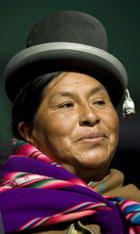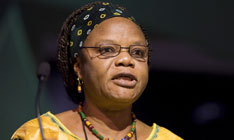Justa Mamani came from her home in Bolivia to deliver a message of thanks to delegates at the 2008 United Methodist General Conference.

Justa Mamani of Bolivia thanks delegates for donations to The Advance.
"I want you to know that the donations you give to The Advance are what sustain my community today," she said, during an April 28 presentation on the denomination's voluntary giving program at the Fort Worth Convention Center.
Sixty years ago, as a response to the devastation and humanitarian toll of World War II, the "worldwide Advance" was created as both a ministry of relief and message of the gospel. Since then, more than $1.3 billion has been channeled through The Advance for Christ and His Church as a "second-mile" giving program.
The Women's Enrichment Program in Bolivia helps prepare women for leadership roles and offers courses in Bible studies, evangelism, and nutrition and health.
For Mamani and her fellow members of the Methodist Women's Federation of Bolivia, support from The Advance allows them to make blankets and other woolen items, which are then sold to customers, mostly in North America.
"Through the sales of these goods, we are able not only able to feed our children but also to send them away for school," she said through a translator. "I am so proud to tell you that my three daughters have completed high school. Each one of them will be a professional who will come back and give to the community."
The women of the Bolivian collective sewed the bags given by the Advance to General Conference delegates.
Helping pregnant women
Janet Yema Bio, a midwife at the United Methodist-related Kissy Hospital in Sierra Leone, was able to start a program for women with high-risk pregnancies with Advance support. About 400 pregnant women come to the hospital each week.

With support through the Advance, Janet Yema Bio helps women in Sierra Leone with high-risk pregnancies.
Kissy has made a remarkable comeback from the period when it was nearly destroyed by rebels during Sierra Leone's civil war. Bio spoke about struggling to find blankets and mattresses for the few beds that remained. Today, the hospital has more than 22,000 patients and delivers 100 babies a month.
"We continue to have a reputation as a hospital that cares about people," she told the delegates.
With projects in more than 100 countries, The Advance stands for accountability, integrity and transparency, according to Cashar Evans, a North Carolina layman who heads The Advance Committee, a part of the United Methodist Board of Global Ministries.
"Through the Advance, every dollar you give goes directly to the project you designate," he said. "These gifts are tangible means of sharing God's love."
The denomination's responses to disasters-such such as Hurricane Katrina and the 2004 Asian tsunami-and supplementary support to missionaries also are part of The Advance.
Not all projects funded
Projects chosen for the program submit a budget, but funding is not guaranteed, according to Shawn Bakker, director of The Advance. "Part of the role of The Advance is to promote (those) projects," she said.
Bishop Larry Goodpaster of Montgomery, Ala., who serves as the committee's vice chairperson, noted that "not every project has been funded, so we're taking a look at that. But it's always been about responding to human need."
The hope, he added, is to build better relationships with both Advance contributors and with those who are part of its projects.
A new Web site, www.advancinghope.org, was launched in April as part of an updating and revamping of the program. Bakker said a more comprehensive listing of projects in 2009 will be part of the expanded database available through the Web site.
*Bloom is a United Methodist News Service writer based in New York.
News media contact: Linda Bloom, e-mail: [email protected].
Phone calls can be made to the General Conference Newsroom in Fort Worth, Texas, at (817) 698-4405 (817) 698-4405 until May 3. Afterward, call United Methodist News Service in Nashville, Tenn., at (615) 742-5470
(817) 698-4405 until May 3. Afterward, call United Methodist News Service in Nashville, Tenn., at (615) 742-5470 (615) 742-5470.
(615) 742-5470.
Video
Women's Enrichment Program, Bolivia
Kissy Hospital, Sierra Leone
Justa Mamani: "My dream was for my children."
Janet Bio: "The rebels destroyed everything."
Related Articles
General Conference headlines
Resources
The Advance for Christ and His Church
General Conference 2008
Like what you're reading? Support the ministry of UM News! Your support ensures the latest denominational news, dynamic stories and informative articles will continue to connect our global community. Make a tax-deductible donation at ResourceUMC.org/GiveUMCom.




